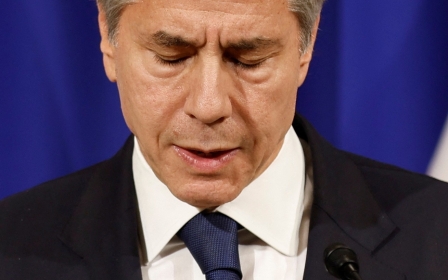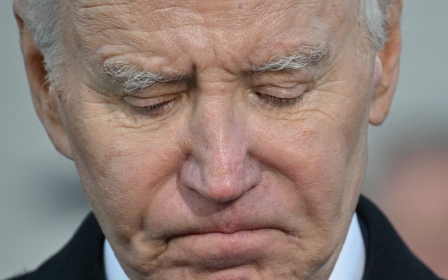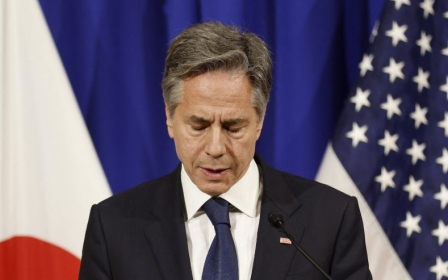War on Gaza: US foreign policy needs a reset in 2024

In a Foreign Affairs essay published in October, US National Security Adviser Jake Sullivan confidently wrote that the Middle East region was “quieter than it has been for decades” - a line that was removed from the online version of the piece.
He credited Washington with de-escalating the Israel-Palestine conflict, an assertion that contrasts starkly with the grim reality in Gaza today. This discrepancy raises questions about how a high-ranking US official could be so wrong in characterising, evaluating and anticipating the situation in the Middle East.
This pattern of misjudgment is not limited to Sullivan or the current administration. It reflects a mistaken belief from previous administrations, including that of former President Donald Trump, that ignoring the Palestinian issue would have no consequences - and that disregarding their fundamental rights would not elicit a substantial response from Palestinians, Arabs and Muslims.
The consequences of these oversights are now clear, mirroring past US foreign policy follies in Iraq and Afghanistan, the Arab Spring, the Iran nuclear deal and the Syria war, among others.
We were told that the 9/11 attacks were about hating US democracy and freedom; that former Iraqi leader Saddam Hussein had weapons of mass destruction; that Syrian President Bashar al-Assad was a reformer; that General Abdel Fatah al-Sisi’s military takeover in Egypt was not a coup; that the Iran deal would make the region safer; that Israel was a democracy, and the list goes on.
New MEE newsletter: Jerusalem Dispatch
Sign up to get the latest insights and analysis on Israel-Palestine, alongside Turkey Unpacked and other MEE newsletters
A critical examination of US policy towards the Middle East reveals a pattern of fatal evaluations, policies and decisions that have not only failed to protect US interests, but often undermined them, destabilising the region and triggering wars.
At the heart of these failures are three key factors: the role of lobbyists in key US institutions, the ideological orientation of political elites, and the influence of media and think tanks.
Short-term gains
Perhaps the most direct impact comes from lobby groups, which exert considerable influence over Congress, pushing for policies that align with their interests rather than broader US strategic goals.
Scholars Stephen Walt and John Mearsheimer have argued how the Israel lobby has negative effects on US national interests, resulting in a policy landscape that is often more reflective of the lobby’s interests than those of the US, ignoring the Middle East’s complex realities. This influence is particularly evident in policies related to military aid, economic sanctions and diplomacy, where lobby groups wield significant sway.
Follow Middle East Eye's live coverage of the Israel-Palestine war
Moreover, the increasing ideological polarisation in Washington has led to a Middle East policy that is often more reflective of domestic political agendas than the realities on the ground. This skews decision-making, favouring short-term political gains over long-term strategic interests. In addition to election-focused policies, reading the Middle East and foreign policy through a partisan lens leads to inconsistent and sometimes contradictory approaches.
Compounding this problem is the role of media platforms and influential think tanks, which often promote a biased narrative and intolerant perspective on Middle Eastern affairs. These institutions shape public opinion and policy discussions, frequently prioritising sensationalism and ideological agendas over balanced analysis.
Many people across the region see the US as an enemy, largely due to its unwavering, immoral and unjustifiable support for Israel
The portrayal of the Middle East in much of the US media is replete with stereotypes and oversimplifications, contributing to a public and policy discourse that lacks context, depth and understanding. Think tanks are also beholden to ideological and financial interests, skewing their research and recommendations.
This trilateral alliance has led to a series of policy blunders. It has also resulted in inconsistent alliances and partnerships, undermining trust and credibility in the US in the region. Washington has found itself repeatedly caught off-guard by developments in the Middle East, because its policies are not grounded in a deep understanding of the region.
These blunders are not only making the region and the world a more dangerous place, but they are also contributing to the decline of Washington’s international status and power - even as US elites make increasingly delusional statements about the country’s global leadership.
Seizing the moment
To rectify these missteps, Washington needs to drastically change its approach to the Middle East. This involves freeing itself from the parasites that hijack its policies, cultivating a less ideologically driven approach to policymaking, and ensuring that decisions are based on a strategic assessment of the region’s complexities rather than shortsighted domestic political considerations.
Media outlets and think tanks must commit to a more balanced and nuanced portrayal of Middle Eastern affairs, fostering a public discourse that is informed, balanced, respectful and devoid of stereotypes.
Most importantly, the influence of lobby groups over Congress must be addressed, ensuring that policy decisions are made in the best interests of the majority of Americans and the peoples of the Middle East, rather than a handful of powerful interest groups and corporations.
In light of the far-reaching impacts of Israel’s ongoing war on Gaza when it comes to US credibility, strategic interests and global standing, it would be smart for Washington to start from there and fundamentally reconsider its Middle East policy. Many people across the region see the US as an enemy, largely due to its unwavering, immoral and unjustifiable support for Israel.
To survive the implications of the current war and avoid ceding ground to competitors such as China and Russia, the US must seize the moment to achieve a just, sustainable and comprehensive peace out of this war - one that enables the Palestinian people to restore their full rights and establish a free, sovereign and independent state. Anything short of this would have detrimental long-term consequences for the US.
Washington should condition any future support to Israel on the achievement of this peace. It is essential for the US to ensure that taxpayer dollars are not being used to support Israel’s apartheid regime, ethnic cleansing operations, and colonisation. Furthermore, Washington must cease bolstering regional leaders with the sole aim of protecting Israel, and instead prioritise a genuine stability - one that takes into account the peoples of the region.
It is crucial for the US to recognise that agreements with non-representative governments are unsustainable and do not serve its interests nor legitimise Israel’s involvement in the region. The focus should shift towards fostering authentic stability through responsive and representative governance and real peace, rather than propping up oppressive and murderous regimes.
The views expressed in this article belong to the author and do not necessarily reflect the editorial policy of Middle East Eye.
Middle East Eye delivers independent and unrivalled coverage and analysis of the Middle East, North Africa and beyond. To learn more about republishing this content and the associated fees, please fill out this form. More about MEE can be found here.





